SERIES REVIEW – In Apple TV+’s new eight-part historical drama, Michael Douglas portrays Benjamin Franklin, fighting to secure French support during the American War of Independence, alongside Noah Jupe and Eddie Marsan. The series zeroes in on the challenges of Franklin’s mission amidst diplomatic maneuvers and intrigue. However, both critics and viewers question the balance between historical accuracy and dramatic execution, with the real issue being the series’ dreadfully dull and eventless plot.
In 1776, when Benjamin Franklin arrived in France, he already possessed a level of global fame nearly unfathomable today, considering the slow dissemination of news at the time and “social media” merely existing in the form of hard-to-print and distribute pamphlets. As a diplomat, journalist, publisher, and prolific inventor, he was mostly known for the semi-mythical tales of his “discovery” of electricity and his witty aphorisms, which today might be called “puns.”
The French Connection
Franklin’s mission, undertaken without official governmental orders, was to secure French support—money, supplies, ships, and troops—for the American fight for independence. His reputation, especially its lighter, more entertaining facets perceived by the international community as frivolously “American,” served both as an advantage and a disadvantage. It was like sending an influencer to negotiate peace in the Middle East, assuming the influencer suffered from gout and was the inventor of the glass harmonica.
The goal of the Apple TV+ eight-part series “Franklin” was to strip away the superficial modern-day view of this remarkable Founding Father, revealing his human frailties and the unique genius that—spoiler alert if you’re not up on your history—brought his French campaign to success.
However, “Franklin” is rarely genuinely enjoyable, largely due to its boring and truly eventless plot. Adapted by Kirk Ellis and Howard Korder and directed by Tim Van Patten (Boardwalk Empire, The Sopranos), although the series includes many convincing historical details, it struggles to maintain narrative coherence throughout Franklin’s eight-year mission.
One might wonder if Franklin was really just a playful punster whose genius lay in convincing the French to act against their national interests, hinting at the myopia leading to the French Revolution? Perhaps, we cannot be sure, but it’s quite likely. However, if the “Franklin” series achieves anything, it is that it piques interest in Stacy Schiff’s book, A Great Improvisation: Franklin, France, and the Birth of America, as the series is filled with characters and events that are little more than footnotes to the monotonous main story.
One common reaction to the “Franklin” series was that “This would probably work better in a different context, or as a shorter film.” Another was, “Apple TV+ loves casting Oscar-winning actors as shaggy-haired, farting, older eccentrics—but here, it doesn’t work well.”
Hello there, Mr. Gary Oldman
You guessed it: the latter statement refers to Gary Oldman’s series “Slow Horses,” whose style this production attempts to emulate. Michael Douglas’s portrayal of Franklin is just as cynical, fart-prone, and intended to be extremely amusing—as well as simultaneously mythical and a personality easy to overlook, given that his heyday was long past by the series’ setting. He arrives in France with his grandson, Temple (Noah Jupe), without a clear path to securing the necessary support. The beginning of the American Revolution was disastrous for the Americans, and although some French are captivated by the spirit of freedom and independence represented by the new nation, not a single powerful individual recognizes Franklin’s significance, let alone negotiates with him.
While engaging in background discussions with the Comte de Vergennes (Thibault de Montalembert), the French Foreign Minister, Franklin uses his connections to settle in at the guesthouse of Chaumont (Olivier Claveries), a businessman. Chaumont takes a risk, hoping that future trade with America will exceed the costs of Franklin’s long-term hospitality. Vergennes and Chaumont are much more complex figures in this bizarre situation than Franklin appears, but to most viewers, they’re just another dozen grumpy Frenchmen blended together.
Paris is far from the revolutionary war front, and even the appearance of Gilbert du Motier, the “Marquis de Lafayette” (for Hamilton fans), fails to inject any real action or excitement into this “shadow diplomacy” play, thus the series’ focus shifts towards other elements.
Hidden Intrigues and Lame Romances
Numerous conspiracies swirl around Franklin, orchestrated by his supportive friend and physician, Edward Bancroft (Daniel Mays), and several dour British businessmen who are even less nuanced than the sour French. Additionally, Franklin’s various romantic and semi-romantic entanglements come to light, including his flirtations with Ludivine Sagnier’s Anne Brillon, who, while an interesting historical figure, appears grey and tedious as a romantic character in the series, and Jeanne Balibar’s Madame Helvetius, who is also an intriguing historical figure but as a female character is not compelling and is equally dull.
Then there is the teenage Temple, whose story in reality is far more exciting than the series portrays. He is a character who matures into a man throughout the series—Jupe initially portrays the character convincingly, but as time progresses, becomes increasingly unbelievable. This transformation is accompanied by numerous unnecessary subplots through which he seeks mentors and attempts to lose his virginity.
Eventually, several other American historical figures appear, advancing the main story. Eddie Marsan perfectly captures the stubborn John Adams, although it seems as if he uses a different accent in each episode, while Ed Stoppard appears as the snide and conceited John Jay. HBO’s series “John Adams” skillfully transformed the initially unlikable Adams into a worthy protagonist of a limited series, with Tom Wilkinson’s excellently portrayed Ben Franklin as a much more nuanced character than here, where the protagonist is portrayed by Michael Douglas.
Stylish Cynicism and Superficial Wisdom
Douglas’s sarcastic demeanor and behavior, which is typical of the modern era, are not in themselves off-putting—partly because we don’t know exactly how Franklin spoke, and partly because his character is depicted as a figure who is in many ways modern. What is truly disturbing, however, is the series’ frequent substitution of sharp observations and aphorisms with clichéd generalities and superficial wisdom. It seems this Ben Franklin is closer to the story’s villain than its hero, and there’s only a 10 percent chance that this is intentional. In this series, Franklin is more of a rogue, “womanizer,” yet patriotic figure, often just smirking slyly, frequently superficial and petty, rarely actively engaging in the plot—it’s nearly impossible to respect him from any perspective.
The question arises: if Franklin does not drive the plot, and Temple is mostly preoccupied with finding a mate, possibly for marriage, and the grumpy French are nearly interchangeable, what was attempted to add momentum to the story?
Well, the series’ characters spend a lot of time sitting in various salons or making grand entrances at elaborately staged parties. Unfortunately, even this part of the series does not work well enough… Recent shows such as HBO’s “The Regime” and “A Gentleman in Moscow” have successfully avoided the claustrophobic feeling caused by confined spaces, whereas “Franklin” quickly becomes visually tedious. The series showcases numerous castles, each depicted with a blue-gray filter, but none possess distinct or unique features. Despite being filmed in natural light, they fail to make a lasting visual impression. Attempts at filming on location appear forced and artificial, and although Jay Wadley’s musical score tries to enhance the thriller elements, it is never quite convincing. Nevertheless, the hair and makeup team’s work is consistently commendable, providing outstanding performances. It’s just a pity that all this is for a boring, eight-hour TV series that offers very little.
-Gergely Herpai (BadSector)-
Franklin
Direction - 5.8
Actors - 6.2
Story - 3.8
Visuals/Music/Sounds - 6.2
Ambience - 4.2
5.2
MEDIOCRE
Apple TV+'s "Franklin" series attempts to depict Benjamin Franklin's adventures in France, but the execution falls far short of expectations. Michael Douglas tries to save the day in the leading role, but his character is often just a shadow of what such a historical figure deserves—blame lies not with the veteran actor, but with the weak script. The series' storytelling is sloppy and sluggish, unable to maintain viewer interest despite promising beginnings, and instead of an episodic structure, we get a superficial, boring drama that lacks any real depth or excitement.

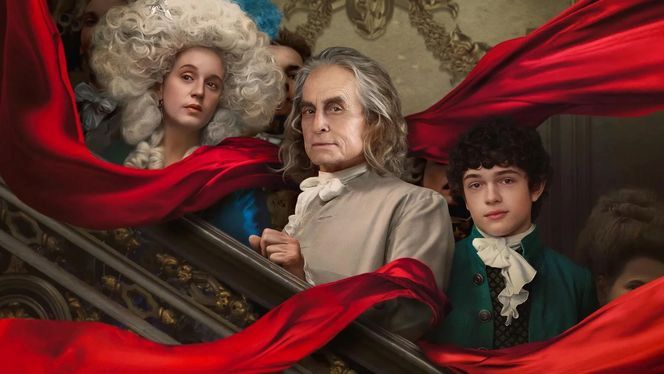
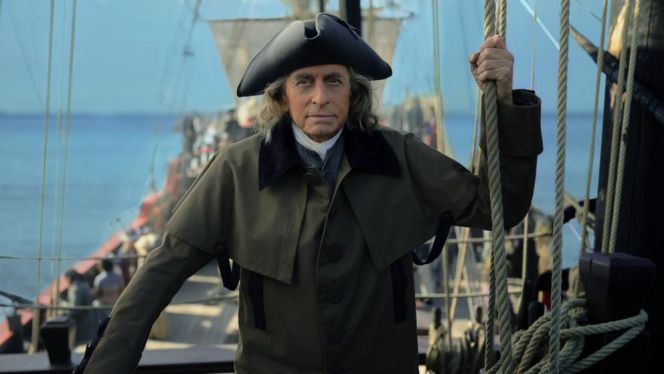
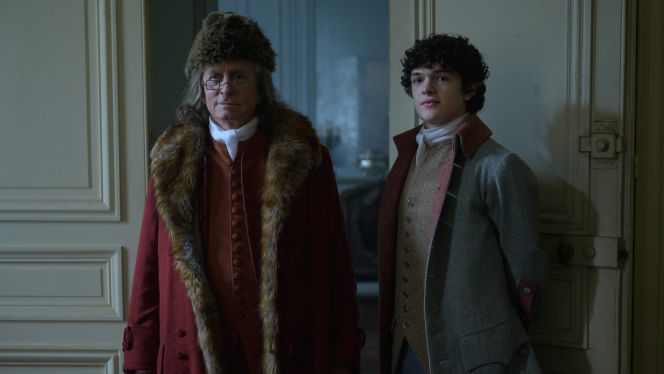
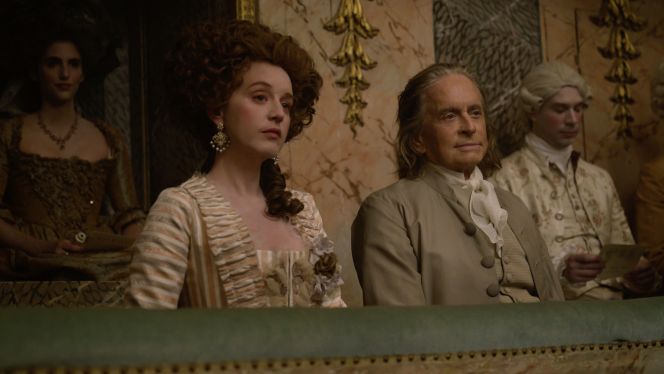

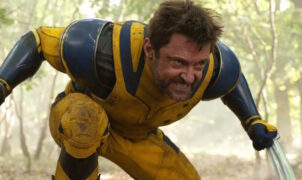
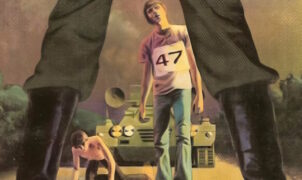



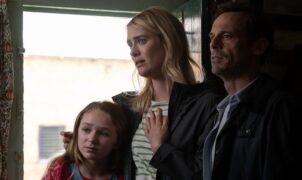


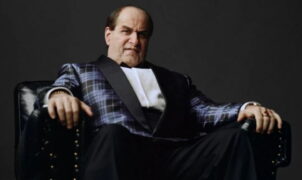




Leave a Reply